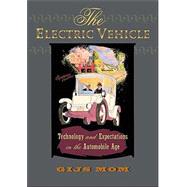
Gijs Mom is an assistant professor in the history of technology at the Technical University of Eindhoven.
| Preface | ix | ||||
| Prologue Substituting for the Horse, Choosing Propulsion | 1 | (16) | |||
| THE FIRST GENERATION (1881-1902) | |||||
|
17 | (47) | |||
|
64 | (37) | |||
| THE SECOND GENERATION (1902-1925) | |||||
|
101 | (30) | |||
|
131 | (43) | |||
|
174 | (31) | |||
| THE THIRD GENERATION AND BEYOND | |||||
|
205 | (45) | |||
|
250 | (25) | |||
| Epilogue Alternative Technologies and the History of Tomorrow's Car | 275 | (28) | |||
| A Note on Method | 303 | (10) | |||
| Abbreviations | 313 | (2) | |||
| Notes | 315 | (56) | |||
| Bibliography and Resources | 371 | (42) | |||
| Index | 413 |
The New copy of this book will include any supplemental materials advertised. Please check the title of the book to determine if it should include any access cards, study guides, lab manuals, CDs, etc.
The Used, Rental and eBook copies of this book are not guaranteed to include any supplemental materials. Typically, only the book itself is included. This is true even if the title states it includes any access cards, study guides, lab manuals, CDs, etc.